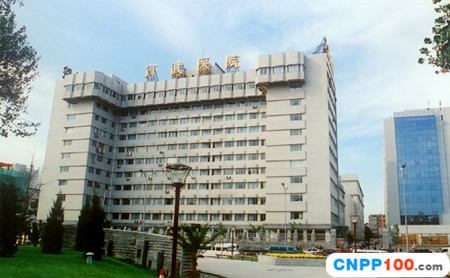
Xuanwu Hospital of Capital Medical University, founded in 1958, is a tertiary general hospital, focusing on neuroscience and geriatrics, with the treatment of cardiovascular and cerebrovascular diseases as the main feature, and undertaking the tasks of medical treatment/education/scientific research/prevention/rehabilitation
Founded in 1958, Xuanwu Hospital of Capital Medical University is a large-scale tertiary general hospital focusing on neuroscience and geriatrics, focusing on the treatment of cardiovascular and cerebrovascular diseases, and undertaking the tasks of medical treatment, education, scientific research, prevention, health care and rehabilitation. It is one of the start-up bases of neuroscience in China and one of the cradles of cultivating neuroscience talents.
Under the guidance of the strategy of "rejuvenating the hospital through science and education and strengthening the hospital with talents", the various branches of neuroscience have continued to grow and develop: neurology is a national key discipline and was once the chairman unit of the Neurology Branch of the Chinese Medical Association; The Department of Neurosurgery and Beijing Cerebrovascular Disease Center are the main participating units of national key disciplines. The Center for Functional Neurosurgery and Movement Disorder Treatment has been named "Clinical Center of Outstanding Achievement" by an international authoritative organization, and is a leading team in this field in China. Beijing Neurology Consultation Center is known as the "ultimate diagnostic institution" in China; Neurointervention, neuropathology, neurorehabilitation, neuromedical imaging, neuropharmacology, neurobiochemistry, neuroelectrophysiology, gene and cell diagnosis, vascular ultrasound diagnosis and other disciplines go hand in hand, condensing into a neuroscience cluster with leading comprehensive strength in China and attracting attention at home and abroad. The Department of Vascular Surgery is led by Professor Wang Zhonghao, chief expert of vascular surgery in China and academician of the Chinese Academy of Sciences, and Professor Zhang Jian, dean, and has become one of the leading teams in this discipline in China. At present, it has 2 national key disciplines, 1 national key cultivation discipline, 6 national key clinical specialties (projects), and 3 Beijing key clinical specialties.
The Beijing Geriatric Medical Research Center and the Beijing Geriatric Health Care and Disease Prevention and Control Center, which are established in this hospital, are responsible for the leading and executive management functions of the elderly health service system in Beijing. It has been built into a unique geriatric system in China that integrates management, service, medical treatment, scientific research, education and other functions, and has become an important base and characteristic brand of geriatric research that plays an exemplary role internally and is a window for communication externally.
The hospital covers an area of 75,000 square meters, with a total construction area of 90,000 square meters, an area of 80,000 square meters, 1,147 open beds, and 480 more after the expansion, with an annual outpatient and emergency volume of more than 2.9 million person-times and nearly 50,000 discharged patients per year.
The institute has more than 440 senior professional and technical personnel, including academicians of the Chinese Academy of Sciences, Changjiang scholars and experts with outstanding contributions who enjoy special government subsidies. It has 30 clinical departments of traditional Chinese and Western medicine and 13 medical and technical departments. It has high-end precision diagnosis and treatment and scientific research equipment such as magnetoencephalography, Siemens dual-source CT (Force), Siemens dual-source CT (Flash), GE gem energy spectrum CT, PET-CT, SPECT-CT, 3.0 T magnetic resonance imaging system, mobile intraoperative radiotherapy system, double C-arm digital subtraction angiography machine, as well as well-equipped digital operating rooms and hybrid operating rooms.
The hospital has 1 Key Laboratory of the Ministry of Education and 7 Key Laboratories of Beijing, including China International Institute of Neuroscience, Beijing Institute of Functional Neurosurgery, Beijing Institute of Neurology of Integrated Traditional Chinese and Western Medicine and Institute of Geriatric Diseases of Integrated Traditional Chinese and Western Medicine, Sino-US Joint Institute of Neuroscience, Institute of Neurology, Institute of Cerebrovascular Diseases, Institute of Vascular Surgery, Institute of Pain Biomedicine, Institute of Hypoxic Medicine, Key Laboratory of Neurodegenerative Diseases of the Ministry of Education and Beijing Key Laboratory and other scientific research institutions. During the 12th Five-Year Plan period, he won 1 national award, 6 provincial and ministerial awards, and 9 social force awards.
The First Clinical Medical College of Capital Medical University is the head unit of the Department of Neurology, the Department of General Surgery, the Department of Dermatology and Venereology, the Department of Geriatrics and the Second Department of the School of Neurosurgery of Capital Medical University, the National Life Science and Talent Training Base of the Ministry of Education, with 20 doctoral programs and 16 master's programs. Many national and Beijing municipal resident training bases, continuing medical education and training bases, and examination centers are also located in this hospital.
It has carried out extensive exchanges and cooperation with the World Health Organization, the United Nations Population Fund and medical research institutions in the United States, Germany, Japan, Italy, Australia, the United Kingdom, France, the Netherlands, Canada, Sweden, Switzerland, South Korea, Austria and other countries.













